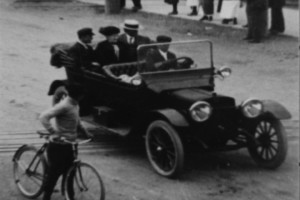By August of 1913, things in the Copper Country were really starting to heat up. The miners had been on strike since the end of July, and the strike was “gradually drifting,” in the words of the Calumet News, “towards its second stage, a period of guerilla warfare.”
The Michigan National Guard — over 2400 troops — were encamped near the Armory and in various locations. They conducted patrols, but were unable to keep the peace. Anyone carrying a dinner pail was likely to be attacked as a strikebreaker — spat upon, beaten, slapped around. There were shootings and somebody tried to dynamite the Red Jacket shaft. When a posse of deputy sheriffs arrived at a Hungarian boarding house near Wolverine, they were fired upon, doused with red pepper, scalded with hot water, and had to dodge a volley of household utensils, then surrounded by a crowd of angry miners. The deputies were able to escape when the militia men drove back the crowd with bayonets.
A thousand strikers and thousands more onlookers gathered at the train station to greet Mother Jones when she arrived in town on August 5th. “These strike movements,” she is reported to have declared after stepping off the Northwestern train, “are the greatest fun in the world.”
One week later, on August 11th, she was quoted in the local paper urging the strikers to stand firm until the mining company met “every concession” of the WFM, and denouncing judges and governors because they served “the interests of the money classes.”
The presence of the National Guard, Mother Jones argued, was more likely to incite than quell violence: “militia have no business in an industrial dispute; this is not a revolution.” At the same time she pleaded with the men to steer clear of trouble with the militia, reprimanded them for their lack of organization, and urged them to see this as a defining moment for the country:
I want you to use your brains, not your hands…Your masters want you to use your hands. I see they have the militia up here to take good care of you. The militia loves you dearly. You make the guns and the bayonets and they’ve got to be used on you.
I’ve had experience with the militia. They’re not bad fellows. All there is about it, they put on dress uniforms and let you know they’ll clean hell out of you if you don’t do as they tell you. Washington and Lincoln didn’t want the militia. We didn’t have the militia in their days. We were Americans then.
What’s the matter with you fellows? Why don’t you elect the right men to public offices? You elect these men and most of you take a glass of beer — scab beer — for your votes and let it sink into your groggy, scab brains. You did that and you elected a scab governor to bring out the militia and camp on company ground and take care of company property. This ground belongs to you.
Don’t carry a gun or pistol. Let the other fellow do that. If he goes after you use your fists and black his two eyes and then he can’t see to shoot you.
You don’t need to have a fight here. Just be firm and peaceful. They can’t operate the mines without you….Just use your brains and wake up to the fact that you have the power.
The capitalists are organized, the doctors are organized, the lawyers are organized and the corporations are organized to skin you. Everyone’s been organized right along but you fellows.
Militarism is becoming an atmospheric disease in America and you see the girls, the poor little things, talking and laughing with the soldiers who come to shoot their fathers.
The stars and stripes shall float in Calumet and Michigan over free workingmen.
Firm and peaceful were not exactly bywords of the day. There would be a fight in Calumet — a big fight. The scuffle at the Hungarian boarding house in early August was just a token of of bigger trouble to come later in the month.
On August 14th, at the Putrich boarding house in Seeberville, where another armed posse had come to arrest another striking miner, Deputy Josh Cooper was struck in the head with a bowling tenpin. The posse opened fire on the men, women and children inside the house. Joseph Putrich and Alois Tijan were shot dead. John Stimac and Stanko Stepic were seriously wounded.
The killings at Seeberville “electrified the scattered mining communities from Painesdale to Mohawk,” writes Arthur Thurner in Rebels on the Range. By August 16th, the Miners Magazine could say, without exaggeration: “a reign of terror prevails throughout the district.”

